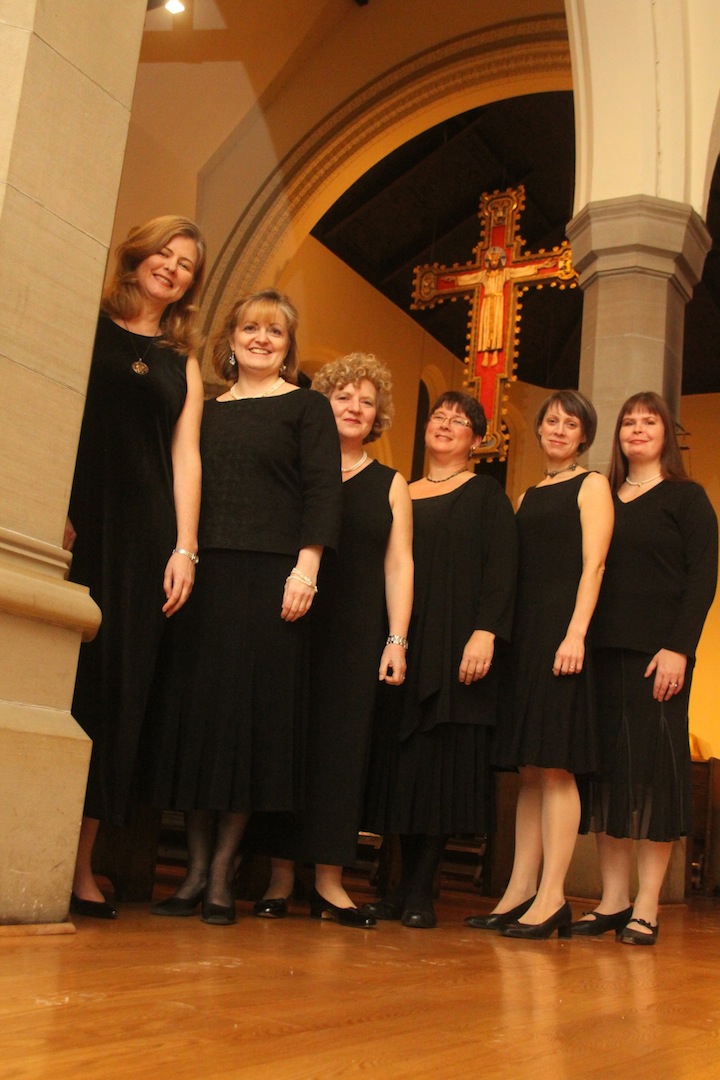
Julia Armstrong, a member of Toronto unaccompanied vocal ensemble Schola Magdalena, reveals some of the thinking behind the group’s latest concert programme — to be heard at the Church of St Mary Magdalene on Friday:
- OPEN LETTER | Christina Petrowska Quilico Remembers Pierre Boulez - January 7, 2016
- Op-ed: The Compositional Voice and the Need to Please - September 4, 2014
- Onomatopoeia: The Thin Edge New Music Collective Sounds Off - May 10, 2014
When Schola Magdalena received a performance invitation from Waterloo’s new music organization NUMUS, we initially asked ourselves, “A new music concert? Us?” After all, we’re a group of six women who specialize in singing medieval music.
But upon reflection, we realized that the NUMUS mandate “to explore the bold sounds and ideas of a new generation of composers and performers while celebrating the innovators of the past” was a good fit.
We enjoy singing everything from plainchant to contemporary polyphony based on chant. And there have been times when we’ve marvelled at how “cutting-edge” Hildegard’s texts are and how newfangled and experimental certain pieces must have sounded to listeners in the Middle Ages.
This week we have the opportunity to showcase both ancient and new on the same program: Schola Magdalena Sings Medieval and Modern is part of the NUMUS main concert series on Thursday, Feb. 7 at 8 p.m. (see details here). We repeat the concert in Toronto the next day at 8 pm at our home venue, the Church of St. Mary Magdalene (pay what you can).
Pérotin, one of the composers featured, definitely qualifies as an “innovator of the past.”
His “Sederunt principes,” a masterpiece of organum quadruplum, is arguably the most avant-garde item on our program and yet it was written in the 13th century.
The foundation of the piece is the plainchant Gradual for St. Stephen’s Day, stretched out into impossibly long notes, above which three voices weave a tangled web of dissonant counterpoint, parallel organum, hocket, and every other medieval device known to the School of Notre Dame.
Schola Magdalena navigates this score in a unique way so that none of us is trapped singing the cantus firmus for 14 minutes straight; we exchange voices throughout, making the texture even more complex.
The first time we performed “Sederunt,” one young audience member was struck by how “awesome” and jazz-like it was, and a student who had previously only read about the work in music textbooks marvelled at the tonalities.
Other medieval works on the programme include a plainchant mass, pilgrim songs, mystic masterpieces by Hildegard von Bingen, and several selections dedicated to the Virgin Mary.
It is also our pleasure to premiere three new compositions as part of the program, two of them thanks to NUMUS.
Emily Walker’s “Ubi caritas” sets an ancient text sung every Maundy Thursday during the ceremony of foot-washing (“Ubi caritas et amor Deus ibi est”/“Where charity and love are, there is God”). Her piece is exquisitely crafted in a gentle modal language and captures the spiritual essence of “caritas et amor,” or what the Greeks called agape.
Meghan Bunce’s lively “Hai Alla Al Walah” is a setting of an Arabic poem that champions the ideals of peace and love. She challenges us with irregular meters and unexpected accents, including a virtuoso hurdy-gurdy accompaniment deftly handled by Ben Grossman.
It is an honour to collaborate with Ben, who also plays percussion for a couple of selections. Not only does he perform medieval music with great understanding, adding a wonderful atmosphere to our pieces, but he is also a composer in his own right, branching out into electro-acoustic compositions for his unique string instrument. Ben demonstrates his improvisational skills in a couple of hurdy-gurdy solo sets.
Over the years, our artistic director, Stephanie Martin, has written some wonderful three- , four- and five-part music for us.
Her “Gloria” receives its Canadian premiere on this program. It was commissioned by Voces Capituli of Antwerp, Belgium, a choir that sang her Mass for Three Voices throughout Advent 2012.
Another favourite of ours is Stephanie’s Missa Lumen, in which the cantus firmus in the lowest voice is derived from the chant for Candlemas, celebrated on February 2. Both masses can be heard on the CD Alleluia, which is available for purchase or download here.
For more about Schola Magdalena’s recordings and upcoming events, please visit www.scholamagdalena.ca or follow us on Facebook.
Here is Schola Magdalena’s music video featuring Stephanie Martin’s “Alleluia,” produced in 2010 by Paulus Productions and BravoFACT for Bravo television:
Julia Armstrong
- OPEN LETTER | Christina Petrowska Quilico Remembers Pierre Boulez - January 7, 2016
- Op-ed: The Compositional Voice and the Need to Please - September 4, 2014
- Onomatopoeia: The Thin Edge New Music Collective Sounds Off - May 10, 2014



